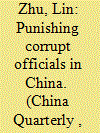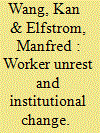| Srl | Item |
| 1 |
ID:
142566


|
|
|
|
|
| Summary/Abstract |
China presents a mixed picture in terms of its anti-corruption efforts. On the one hand, rampant corruption remains a huge challenge for the party-state because it not only results in the loss of state assets but also damages the legitimacy of the regime. On the other hand, China's record of curbing corruption is not particularly worse than other comparable countries. This paper explains the reasons behind this mixed picture by focusing on the anti-corruption strategy employed by the central Party authorities. Effective anti-corruption measures are determined by the high probability of detecting corrupt agents and the meting out of effective and warranted punishment. In China, the central government is unable or unwilling to investigate a large number of officials, especially high-ranking officials. However, at the same time, it must impose severe punishment on convicted high-ranking officials. Although this mode of selective discipline compromises the credibility of the state in terms of anti-corruption efficacy, it also creates uncertainty for corrupt agents because corrupt officials are not guaranteed exemption.
|
|
|
|
|
|
|
|
|
|
|
|
|
|
|
|
| 2 |
ID:
151968


|
|
|
|
|
| Summary/Abstract |
Worker protests in China are increasing in frequency, and workers are making more ambitious demands. However, it is unclear whether this activism is, on the whole, drawing a reformist or conservative response from officials. Using a 2014 survey of city-level leaders from China’s official trade union federation, we find that an acknowledgement of the seriousness of today’s labour disputes and of how the country’s industrial relations are changing is positively correlated with respondents’ optimism regarding the likelihood of changes to China’s political system. To determine exactly what this means ideologically, we further compare reform optimists and pessimists with regard to their support for a range of more specific policies, finding that those who believe systemic changes are close at hand have different views from their peers regarding the importance of engagement with global civil society and a tripartite (government, union, employer) approach to managing workplaces. This provides tentative support for the idea that reform optimists are reform supporters and that interest in change among Chinese officials, at least at the level studied here, is growing alongside workplace conflict.
|
|
|
|
|
|
|
|
|
|
|
|
|
|
|
|